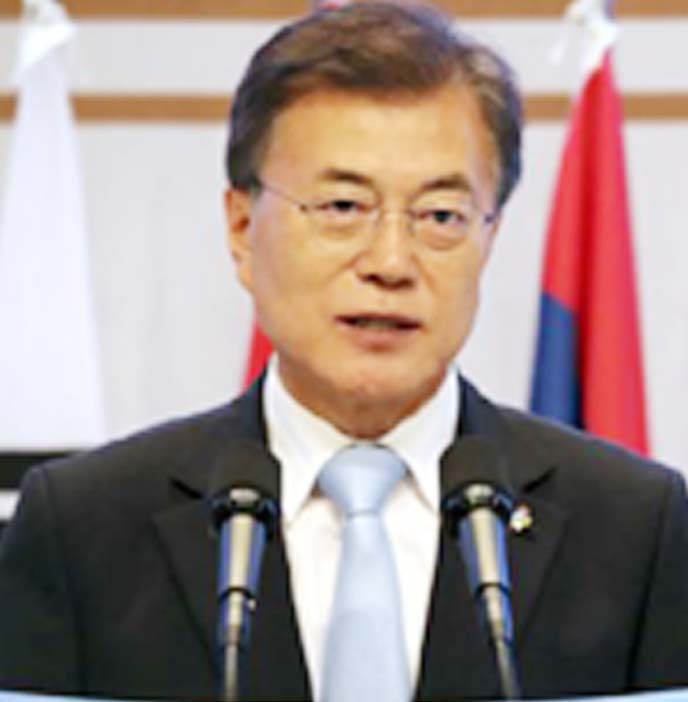
AP, Seoul :
China and South Korea put aside hard feelings over Beijing’s objections to a U.S. anti-missile system to join an annual meeting Friday on the South Korean island of Jeju of a China-backed Asian lending bank.
Chinese finance minister Xiao Jie and his Indian counterpart Arun Jaitley were among those attending the Asian Infrastructure Investment Bank’s second annual meeting, which will wrap up over the weekend.
South Korean officials said finance ministers of the two countries met for talks on the meeting’s sidelines and reaffirmed their “solid economic ties,” agreed to continue collaboration as major founding members of the AIIB.
It was unclear if the meeting will pave the way for a broader thaw in chilled relations. South Korean officials declined to say whether the ministers discussed the thorny missile issue, citing a confidentiality agreement with Chinese officials.
South Korea was picked to host the gathering before Beijing began protesting Seoul’s agreement to let its ally the United States deploy on its territory key components of the so-called Terminal High-Altitude Area Defense system. South Korea and the U.S. say the system is needed to deter a possible North Korean attack but Beijing sees it as a threat to its own security because its radar can peer deep into northeastern China.
Since China began protesting the THAAD deployment in late February, visits by Chinese tourists have dropped sharply and some companies operating in China, South Korea’s largest trading partner, were asked to suspend their operations there.
The brouhaha between Seoul and Beijing stopped hogging local headlines after South Korea’s new president took office in May and ordered an environmental review before completing the missile defense system’s deployment.
Sustainable energy is a key theme at this year’s meeting. The issue has taken front stage following U.S. President Donald Trump’s recent decision to withdraw from the Paris climate accord, which the president characterized as being unfair to the U.S.,
In a statement issued Friday, the AIIB said it supports its members “to do their part as expressed in the Paris Agreement” and pledged to prioritize investment in renewable energy projects and projects that enhance the energy efficiency of existing infrastructure.
China and South Korea put aside hard feelings over Beijing’s objections to a U.S. anti-missile system to join an annual meeting Friday on the South Korean island of Jeju of a China-backed Asian lending bank.
Chinese finance minister Xiao Jie and his Indian counterpart Arun Jaitley were among those attending the Asian Infrastructure Investment Bank’s second annual meeting, which will wrap up over the weekend.
South Korean officials said finance ministers of the two countries met for talks on the meeting’s sidelines and reaffirmed their “solid economic ties,” agreed to continue collaboration as major founding members of the AIIB.
It was unclear if the meeting will pave the way for a broader thaw in chilled relations. South Korean officials declined to say whether the ministers discussed the thorny missile issue, citing a confidentiality agreement with Chinese officials.
South Korea was picked to host the gathering before Beijing began protesting Seoul’s agreement to let its ally the United States deploy on its territory key components of the so-called Terminal High-Altitude Area Defense system. South Korea and the U.S. say the system is needed to deter a possible North Korean attack but Beijing sees it as a threat to its own security because its radar can peer deep into northeastern China.
Since China began protesting the THAAD deployment in late February, visits by Chinese tourists have dropped sharply and some companies operating in China, South Korea’s largest trading partner, were asked to suspend their operations there.
The brouhaha between Seoul and Beijing stopped hogging local headlines after South Korea’s new president took office in May and ordered an environmental review before completing the missile defense system’s deployment.
Sustainable energy is a key theme at this year’s meeting. The issue has taken front stage following U.S. President Donald Trump’s recent decision to withdraw from the Paris climate accord, which the president characterized as being unfair to the U.S.,
In a statement issued Friday, the AIIB said it supports its members “to do their part as expressed in the Paris Agreement” and pledged to prioritize investment in renewable energy projects and projects that enhance the energy efficiency of existing infrastructure.

